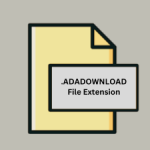.PMM File Extension

MikuMikuDance PolygonMovieMaker File
| Developer | MikuMikuDance |
| Popularity | |
| Category | Data Files |
| Format | .PMM |
| Cross Platform | Update Soon |
What is an PMM file?
.PMM file extension stands as a hallmark for enthusiasts of animation, particularly within the realm of MikuMikuDance (MMD).
The .PMM file, short for PolygonMovieMaker, is a proprietary file format utilized by MMD, a freeware animation program originating from Japan.
This article delves into the intricacies of .PMM files, exploring their origins, structure, conversion methods, and compatibility across various operating systems.
More Information.
The primary purpose of .PMM files within MikuMikuDance is to serve as project files encapsulating various elements of an animation project.
These files store crucial data such as character models, motion data, camera settings, and scene configurations.
By consolidating these components into a single .PMM file, MMD users can easily save and share their projects, facilitating collaboration and creative exchange within the MMD community.
Origin Of This File.
The genesis of .PMM files can be traced back to the early 2000s when MikuMikuDance emerged as a popular animation software developed by Yu Higuchi.
Initially released in 2008, MMD gained rapid traction among users due to its user-friendly interface and the ability to create captivating animations featuring 3D characters, primarily Vocaloid characters like Hatsune Miku.
As MMD’s popularity soared, so did the utilization of .PMM files, which became synonymous with MMD projects.
File Structure Technical Specification.
Underneath the surface, .PMM files exhibit a structured layout designed to accommodate diverse elements of an animation project. At their core, .PMM files are essentially archives, encapsulating multiple files and directories. These include:
- Model Data: Information regarding 3D character models utilized within the animation.
- Motion Data: Data pertaining to character movements and animations.
- Camera Data: Settings and configurations related to the camera angles and movements.
- Scene Configuration: Parameters defining the overall scene setup and environment.
- Accessory Data: Details regarding additional elements such as props or accessories within the scene.
The .PMM file format is proprietary to MMD, and as such, its technical specifications are not publicly disclosed. However, reverse engineering efforts have shed light on the underlying structure, enabling third-party tools to manipulate .PMM files to some extent.
How to Convert the File?
Converting .PMM files to other formats may be necessary to broaden their compatibility or facilitate integration with other software. While direct conversion tools are tailored specifically for .PMM files are scarce, alternative methods can be employed:
- Exporting to Common Formats: MMD offers options to export animation data in widely supported formats such as .BVH (Biovision Hierarchy) for motion data and .OBJ (Wavefront Object) for 3D models.
- Third-party Plugins and Tools: Community-developed plugins and tools for MMD may provide functionality to export .PMM files to alternative formats or import them into other animation software.
- Manual Reconstruction: In some cases, manually reconstructing the animation project in a different software environment may be necessary, albeit labor-intensive.
Advantages And Disadvantages.
Advantages:
- Comprehensive Project Management: .PMM files allow users to consolidate all project-related data into a single file, simplifying project management and organization.
- Easy Sharing and Collaboration: By sharing .PMM files, MMD users can collaborate seamlessly on animation projects, fostering community engagement and creativity.
- Preservation of Project Integrity: With .PMM files, users can preserve the integrity of their animation projects, ensuring that all components remain intact and accessible for future modifications or rendering.
Disadvantages:
- Dependency on MikuMikuDance: .PMM files are inherently tied to MMD, limiting their usability outside of the MMD ecosystem.
- Limited Compatibility: Due to their proprietary nature, .PMM files may encounter compatibility issues with third-party software or newer versions of MMD.
- File Size: Depending on the complexity of the animation project, .PMM files can be relatively large in size, posing challenges in terms of storage and sharing.
How to Open PMM?
Open In Windows
- MikuMikuDance (MMD): .PMM files are primarily associated with MMD, a freeware animation program. To open a .PMM file in Windows, simply download and install the latest version of MMD from the official website. Once installed, launch MMD, and then navigate to File > Load and select the desired .PMM file to open.
Open In Linux
- Wine Compatibility Layer: Since MMD is primarily developed for Windows, Linux users can utilize compatibility layers such as Wine to run Windows applications. Install Wine on your Linux distribution, then download the Windows version of MMD and install it using Wine. Once installed, follow the same procedure as in Windows to open .PMM files in MMD.
Open In MAC
- Wine or Virtual Machine: Similar to Linux, macOS users can utilize compatibility layers like Wine or virtual machines running Windows to open .PMM files. Install Wine on macOS or set up a virtual machine with Windows installed. Then, download the Windows version of MMD, install it using Wine or within the virtual machine, and proceed to open .PMM files as in Windows.
Open In Android
- MMD Apps: While there may not be native support for .PMM files on Android, there are third-party MMD applications available on the Google Play Store. These apps allow users to view and interact with MMD animations, though support for .PMM files may vary. Look for MMD-compatible apps on the Play Store and follow the instructions provided by the specific app to open .PMM files.
Open In IOS
- Third-party Apps: Similar to Android, there are third-party MMD applications available on the Apple App Store for iOS devices. These apps may provide limited support for .PMM files, allow users to view or interact with MMD animations. Search for MMD-compatible apps on the App Store and follow the instructions provided to open .PMM files within the app.













